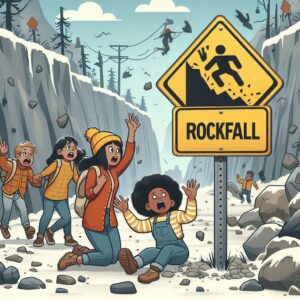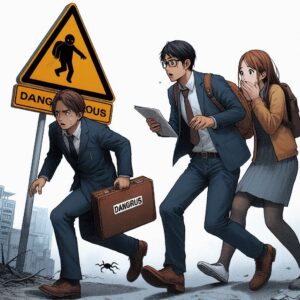君子危うきに近寄らずとは?
意味
「君子危うきに近寄らず」とは、賢明な人は自らを危険にさらすような行動や状況を避けるべきであるという教訓を表した言葉です。
「君子」:人徳や知識を備えた立派な人。
「危うき」:危険やトラブル、災難を指す。
「近寄らず」:遠ざかり、関わらないようにすること。
この言葉は、危険を予見してそれを避ける慎重さや賢明さを強調しています。
背景・由来
「君子危うきに近寄らず」は、中国の古典思想からきた言葉です。
出典:「論語」や「孟子」
中国の儒教では、君子は人々の模範となるべき存在であり、その行動は慎重かつ品位が求められました。
危険や道徳的に問題があることに関わることで、君子の品位や信頼が損なわれる可能性があるため、避けるべきとされています。
この教訓は、道徳的な正しさや自己防衛の重要性を説いており、現代にも通じる普遍的な教えとなっています。
現代での解釈と適用
危険な状況を避ける
具体例:深夜に危険な場所へ出歩かない。
リスクの高い投資話や詐欺の疑いがある話には関わらない。
危険を未然に回避することで、命や財産、信頼を守る行動が「君子危うきに近寄らず」に該当します。
道徳的な危険から遠ざかる
具体例:不正行為や悪事に巻き込まれる可能性がある場には近づかない。
違法性のある誘いに断固として乗らない。
社会的な信頼を守るためにも、道徳的に問題のある場や行為を避けるのが重要です。
感情的なトラブルを避ける
具体例:不必要な口論や争いに巻き込まれないようにする。
感情的な問題を冷静に処理し、トラブルを避ける。
相手の意図を見抜き、慎重に行動することで人間関係のトラブルを防ぐことも、この言葉の適用例です。
教訓
慎重さの重要性
感情や衝動に流されず、冷静にリスクを判断し回避することで、自分や周囲の安全を守ることができます。
危険を予測する能力
賢い人は危険を察知する能力を鍛え、未然に行動を取ります。この慎重さがトラブルを避け、結果として成功や信頼を築く助けとなります。
品格の保持
不道徳な行為や危険な環境に近づかないことで、自分の品位や信頼を守ることができます。これは長期的に見て、社会的信用を得るために必要です。
使用例
日常生活での使用例
「あの投資話は怪しそうだし、君子危うきに近寄らずだよ。無理して関わらない方がいい。」
詐欺や危険なビジネスの誘いを避ける。
「深夜にあの通りを通るのはやめよう。君子危うきに近寄らずだね。」
自分の身を守るために危険な行動を避ける。
教訓的な使用例
「君子危うきに近寄らずというけど、やっぱり慎重に考えて行動しないと後悔するよね。」 → 大きなリスクを伴う決断を避ける際の格言として使われます。
類似した言葉と対義語
類義語
「石橋を叩いて渡る」:用心深く慎重に行動する。
「油断大敵」:危険を軽視すると災いを招く。
「備えあれば憂いなし」:事前に準備をすることでリスクを回避できる。
対義語
「果敢に挑む」:危険を恐れずに積極的に立ち向かう。
「危険を冒す」:成功のためにリスクをあえて取る。
「冒険心を持つ」:新しい挑戦や未知のリスクに興味を持つ。
注意点
「君子危うきに近寄らず」を誤解すると、慎重すぎて行動力を失うリスクがあります。挑戦が必要な場面や、リスクを受け入れることで得られる成功もあるため、適切なバランスが重要です。
「君子危うきに近寄らず」は、賢明な判断力と慎重さを保ち、自分自身や周囲を守るための教訓です。危険や不正から遠ざかることで、安心と信頼を確保できる一方、過度な慎重さは行動力を失う可能性もあるため、柔軟な考え方で適用することが望ましいと言えます。
Meaning
The phrase “Kimi ni kakaku ni kaki ni kakaru” means that a wise person should avoid actions and situations that put himself in danger.
Kimiko: A person of virtue, knowledge, and respectability.
Dangerous”: danger, trouble, or calamity.
Keep away”: to stay away from, to avoid getting involved in.
The word emphasizes prudence and wisdom in foreseeing danger and avoiding it.Background and Origin
The phrase “Kimiko kiki ni kakaku ni nakazarakutei” comes from classical Chinese thought.
Sources: “The Analects” and “Mencius.
In Chinese Confucianism, the sovereign was to be a role model for people, and his actions were expected to be prudent and dignified.
Engaging in anything dangerous or morally problematic was to be avoided because it could undermine the dignity and trust of the sovereign.
This precept, which teaches the importance of moral rectitude and self-preservation, is a universal teaching that is still relevant today.Interpretation and application in modern times
Avoid dangerous situations
Specific examples: Do not go out late at night to dangerous places.
Do not get involved in risky investment talks or suspected scams.
Actions that protect life, property, and trust by avoiding danger before it occurs fall under the category of “keep your children away from danger.Stay away from moral dangers.
Specific examples: Stay away from places where you may be involved in fraud or wrongdoing.
Decisively refrain from accepting invitations that may be illegal.
It is important to avoid morally problematic venues and actions in order to preserve social trust.Avoid emotional troubles.
Examples: avoid getting involved in unnecessary arguments or disputes.
Handle emotional issues calmly and avoid trouble.
Another example of application of this term is to prevent relationship problems by discerning the intentions of others and acting prudently.Lesson Learned
Importance of prudence
By calmly judging and avoiding risks without being driven by emotions or impulses, we can keep ourselves and those around us safe.Ability to anticipate danger
A wise person develops the ability to perceive danger and take action before it occurs. This prudence helps them avoid trouble and consequently build success and trust.Preservation of Dignity
By staying away from immoral activities and dangerous environments, one can protect one’s dignity and trust. This is necessary in the long run to gain social credibility.Examples of Usage
Examples of use in daily life
I’m not going to get involved in that investment talk because it sounds fishy and you are in danger. It is better not to get involved.”
Avoiding scams and dangerous business offers.Don’t walk down that street late at night. You and your children should stay away from danger.”
Avoid risky behavior to protect yourself.Didactic example
It’s true that you should stay away from danger, but you should also think carefully before you act, or you will regret it.” → Used as a maxim when avoiding decisions involving great risk.Similar Words and Synonyms
Synonyms
To cross a stone bridge: to act cautiously and prudently.
Cautiousness is the enemy of caution.
Preparedness is the best way to avoid risk.Synonyms
Daring to take risks: to take risks aggressively and without fear.
Risk-taking: Daring to take risks for the sake of success.
Adventurous: Interested in new challenges and unknown risks.Cautions
If you misunderstand the phrase, “You are never too close to danger,” you run the risk of being too cautious and losing the ability to take action. There are situations that require challenges and successes that can be gained by accepting risks, so it is important to strike the right balance.Kimi ni kakaku ni kakaru“ (”You and your child should stay away from danger”) is a lesson in maintaining wise judgment and prudence to protect oneself and one’s surroundings. While staying away from danger and injustice can ensure security and trust, excessive prudence can also lead to loss of action, so it is advisable to apply it with a flexible mindset.
AIが描いた「君子危うきに近寄らず」






















コメント